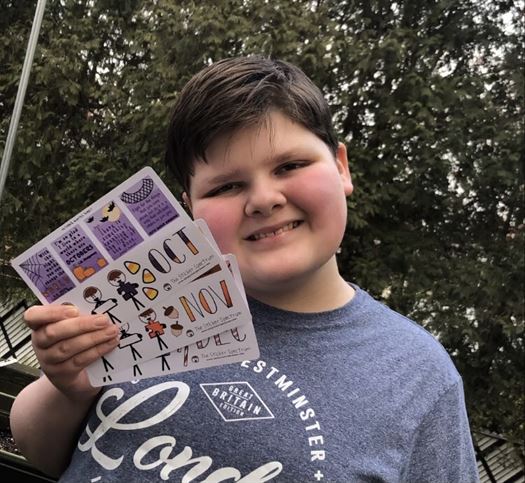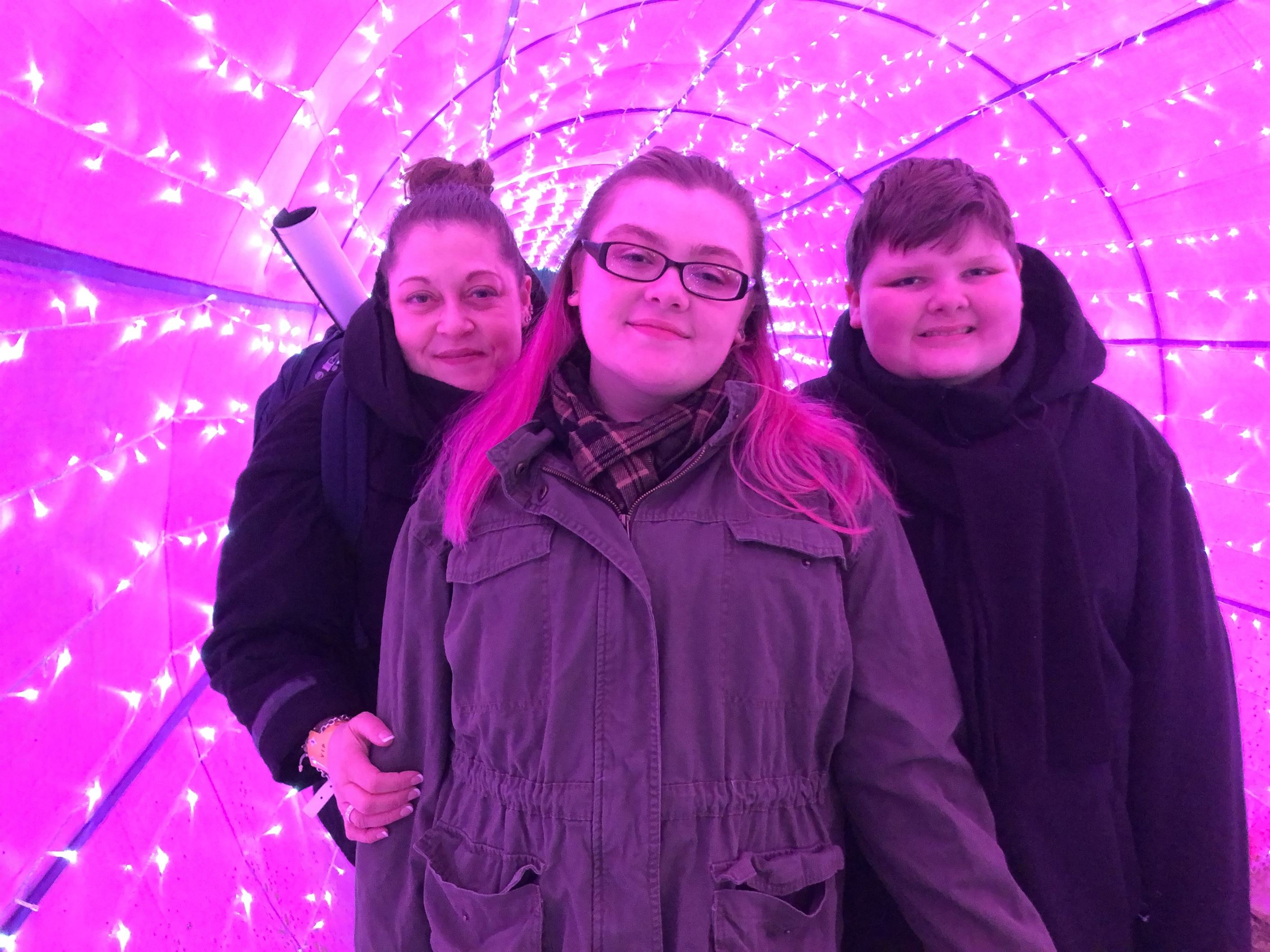Meet Stick, the face of The Sticker Spectrum. You’ll see Stick doing all sorts of things on his stickers, from wearing dresses (Stick’s artist, Liam McCormack, says he likes to break gender stereotypes) to celebrating whichever holiday is around the corner.
But the most common thing that you’ll see Stick do is hold up a rainbow infinity sign, symbolizing autism acceptance. That’s the central goal of Liam’s art and his family business, The Sticker Spectrum.

Stick, Liam McCormack’s character for The Sticker Spectrum, takes on many roles and appearances.
Image courtesy of The Sticker Spectrum
The Sticker Spectrum is the family-run sticker business of the McCormacks of Dumont, New Jersey. The business aims to spread autism acceptance and knowledge through the art of Liam, an autistic teenager.
Liam was diagnosed with autism a few months before his second birthday in April of 2009. He was put through early intervention therapy until he was three years old and began preschool. Growing up and even to this day, he struggled with social skills, as many in the autistic community do.
But Liam has a talent: drawing. It was this talent that would eventually be the spark of The Sticker Spectrum, as Jodi McCormack, Liam’s mother and the head of The Sticker Spectrum, explained.
“We wanted to give Liam something that he could be proud of, that we could put out in the world, that we could share what he does,” Jodi said. “And we just decided we’re going to start a business.”

Liam McCormack is the artist behind the stickers for The Sticker Spectrum.
Photo courtesy of Emily McCormack
The Sticker Spectrum is made up of Jodi, Liam and his sister, Emily McCormack, a sophomore film and television major at Montclair State University. The Sticker Spectrum designs stickers for a variety of causes, such as LGBTQ+ pride stickers and stickers for essential workers. But autism is a number one priority for the business and the McCormacks do much to spread acceptance of autism.

(From left to right): Jodi, Emily and Liam McCormack make up The Sticker Spectrum.
Photo courtesy of Emily McCormack
Switching from using the puzzle piece to represent autism to using the infinity sign, a less controversial and more accepted symbol, was part of this effort. Emily is the social media manager and graphic web designer of The Sticker Spectrum. She knows the impact the change had.
“We made the switch from puzzle pieces to infinity symbols because we would never want to use a symbol that people [in the autistic community] didn’t like. Because puzzle pieces represent that there’s a piece missing from someone, and that’s not the case,” Emily said. “So we decided to go with another symbol [that is] not only more widely accepted but something that we also felt more proud to utilize and felt like it was a better representation for what we stand for.”

Emily “Emol” McCormack, a sophomore film and television major, is Liam’s sister and the social media manager and graphic web designer for The Sticker Spectrum.
Sal DiMaggio | The Montclarion
Another initiative the family business has taken is the yearly tradition of their blog series, “30 Days of Liam.” The series happens every day of April each year, which is Autism Acceptance Month. The goal is to showcase Liam’s life and experiences as someone with autism to the outside world.
“It pretty much shows the world that autistic people are capable of doing things,” Liam said. “By sharing my journey it gets people to experience the life of someone with autism.”
Liam did note that his experiences with autism are not universal, however.
“But the thing is [with ’30 Days of Liam’], it’s not supposed to represent the entire autistic community,” Liam said. “Everyone with autism is different.”

The Sticker Spectrum is a family-run business that aims to promote autism acceptance and pride.
Photo courtesy of The Sticker Spectrum
The Sticker Spectrum has also connected with others in the autistic community. Other members can be great resources for the business, according to Jodi.
“I did meet one family. [My friend] Bethanne, has a son, Jonny, who is on the autistic spectrum,” Jodi said. “He’s about eight years old and once we started [The Sticker Spectrum], she reached out to me. I knew her from the planner community and she was thanking me for starting the business. She loved the stickers and she started giving me some suggestions on things we can do.”
Bethanne Harms from Lansing, Michigan was one of the first customers of The Sticker Spectrum and has followed them ever since. Harms is autistic herself, so her support of the business stems from her own experiences.
“My support of The Sticker Spectrum is deeply rooted in seeing autistic creators succeed,” Harms said. “I think they do an amazing job with promoting autism acceptance. And with The Sticker Spectrum, the fact that it is Liam’s artwork that shines. He is a great role model for autistic kids out in the world that they can do anything.”

Bethanne Harms from Lansing, Michigan is an avid supporter of The Sticker Spectrum.
Photo courtesy of Bethanne Harms
To Liam, that’s what The Sticker Spectrum is all about: showing that autism doesn’t limit anyone’s ability to succeed.
“The Sticker Spectrum is meant to show that people with autism are just as capable as anyone else,” Liam said. “That’s what I want to show with the business. I want to show people not only my artistic talent but the talent that can resonate within anyone in the autistic community.”
You can check out The Sticker Spectrum’s website, as well as their Instagram to see their products and learn more about their story and autism acceptance. You can read “30 Days of Liam” on those platforms as well.


